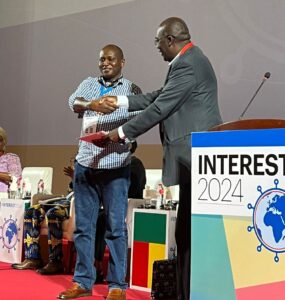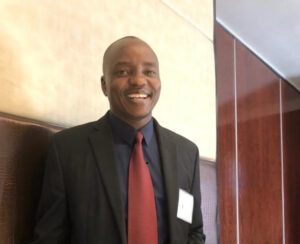Upon receiving my Masters in Health Economics from Australia in 2013, I was enthusiastic to begin my PhD at the earliest possible time. My passion for pursuing a PhD was mainly to assist in the capacity building of the Pharmacy Department at the University of Malawi’s College of Medicine (now Kamuzu University of Health Sciences). As a new programme, the pharmacy department had only a few PhD-holder educators and one international professor. This became my motivation to be among the few pharmacists to acquire a PhD and enhance the department’s research capabilities. It should be noted that Malawi had very few pharmacists with PhDs at the time.
I sought to find suitable supervision locally in order to be enrolled at the University of Malawi, since I did not want to embark on this long journey away from my country, my university, and my family. Though PhD opportunities in the pharmaceutical field are scarce, the University of Malawi-College of Medicine has an approved PhD programme as long as suitably qualified supervisors are available.
Then, by luck, under the stewardship of Professor Lutz Heide, the thought of pursuing a PhD in Pharmacy at the University of Malawi (UNIMA) began to appeal to me. Professor Heide is a pharmacist who was appointed through the GIZ-CIM programme to help enhance the Pharmacy Department. I applied for a CARTA PhD scholarship, which was supplemented with a GIZ-Malawi research grant, to investigate the quality of medications in Malawi. With this grant, I was able to enrol in UNIMA’s PhD programme, and Prof. Heide was supportive of my CARTA scholarship application. This was our Pharmacy Department’s first PhD enrolment.
Being the first PhD entrant meant that the road ahead would not be easy. The CARTA scholarship came to my aid in bridging this gap. CARTA’s program organizes Joint Advanced Seminars (JASes), which are meant to mentor and support PhD candidates from diverse African nations. Since then, my journey with JASes has reignited the academician in me, propelling me to greater heights.
The JASes that I completed during my CARTA scholarship enriched me and continued to bear fruit. I had one publication and one local conference presentation before the CARTA mentoring and JASes. Through the mentorship in JASes, I began dreaming of extending my footprint in publications and research grant applications. During my PhD, this resulted in a number of high-quality publications, as well as local and international dissemination of study findings. Despite the fact that UNIMA criteria allowed for a PhD to be obtained solely through the completion of a thesis paper, JASes emphasized that a PhD should be supported by a number of publications in order to be more successful. As a result, I was able to publish my first three papers for my PhD thesis, with the support of my supervisors. The support from CARTA during my PhD was invaluable, allowing me to graduate earlier than the majority of my university’s other PhD candidates.
This culture of publication has become so ingrained in me that I have progressed from one publication prior to CARTA, to around 17 publications currently, with the numbers continuing to rise (https://pubmed.ncbi.nlm.nih.gov/?term=felix+khuluza). My work has been published in reputable journals and has influenced policy both locally (Malawi) and internationally. A key example is in two of my earlier works that were included in a WHO-review paper on “A study on the public health and socioeconomic impact of substandard and falsified medical products,” which is a significant accomplishment.
Has the CARTA culture developed an impact on my publications alone? No. The great writing culture that is seen in my numerous papers has also influenced my grant writing. Prior to CARTA, I received a maximum of two research grants, with a total value of around USD 70,000. CARTA has improved my grant writing skills, resulting in the award of six other grants totalling approximately USD 820,000 since then. The most recent is the EDCTP grant worth EUR 149,148. The fact that these grants were awarded has demonstrated that my research output has greatly improved, while my grant management skills have also been enhanced.
Prior to CARTA, I was only involved in a minimal fraction of undergraduate research supervision. Currently, I have been devoting much of my time in postgraduate student supervision with the aim to enhance the next generation of critical thinkers and researchers. As part of my recent EDCTP grant. I focused on having one PhD student registered and supported by the grant, as well as several undergraduate student projects with research groups that include female members. The inclusion of females is to encourage girls to participate in research and science, as we know that there are very few females in Africa who are interested in scientific-related courses.
Finally, my research efforts resulted in significant local interventions. I have been able to organise a range of key seminars at which the Secretary for Health and the Chief of Health Services from Malawi’s Ministry of Health has attended as the guest of honour. One of the local events was also graced by the presence of the German Ambassador to Malawi. The aim of these seminars was to share key results in order to inform policy. Furthermore, some of our research findings led to the withdrawal of many substandard medicines from Malawi’s health system.
In great measure, I accredit this to CARTA, GIZ-Malawi, their management, and other various funders, as well as the guidance of my numerous mentors, with Prof. Heide taking the lead. For this incredible journey, I owe a debt of gratitude to the management of Kamuzu University of Health Sciences (formerly College of Medicine, University of Malawi) as well as our CARTA cohort five colleagues. My appreciation especially goes out to my wife and sons for their immeasurable support throughout this journey.
Felix (Cohort Five Fellow, University of Malawi) is a lecturer at the Pharmacy Department, Kamuzu University of Health Sciences (formerly College of Medicine, University of Malawi).




